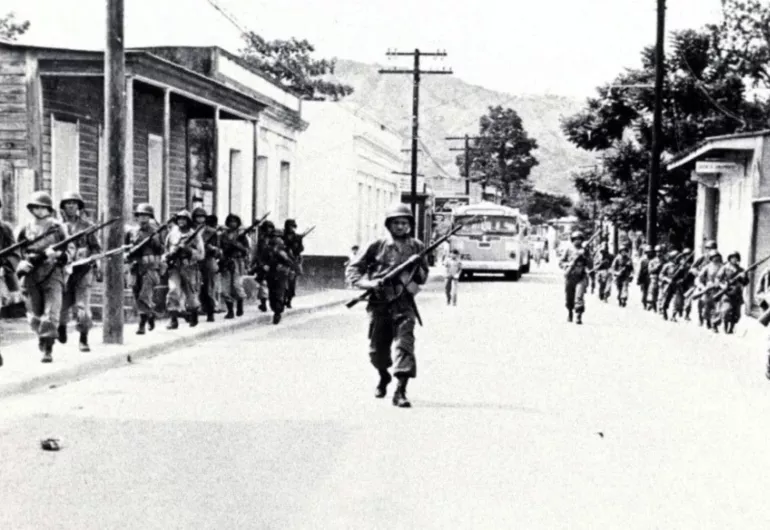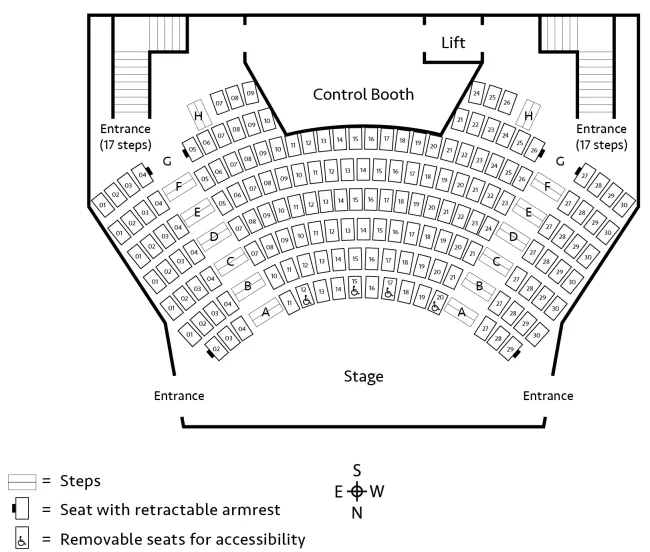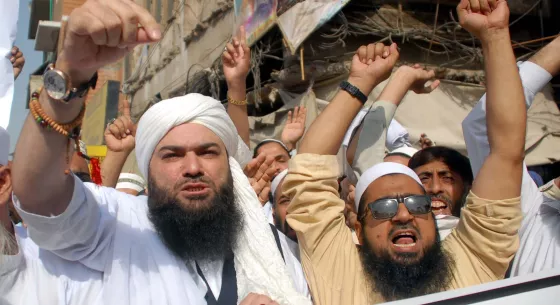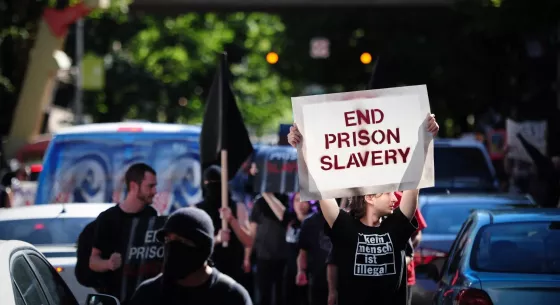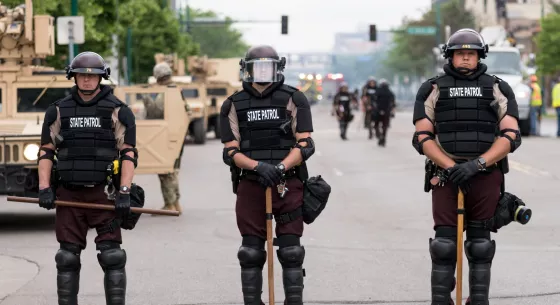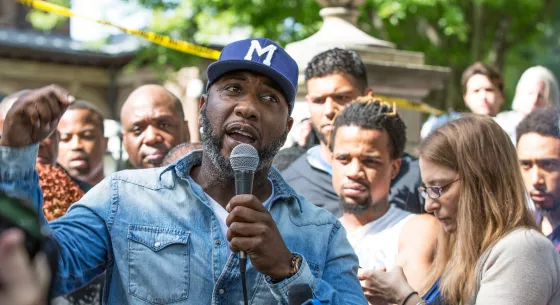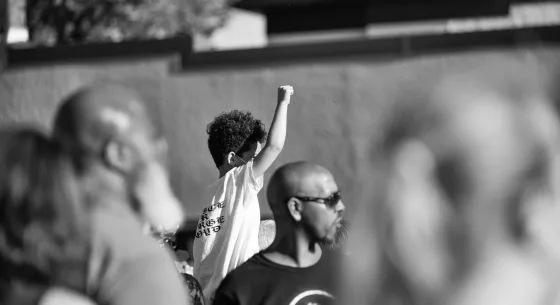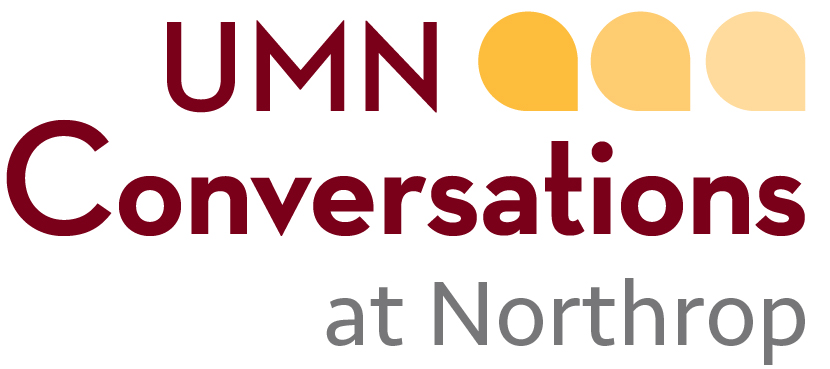Dive deep into the intricate relationship between colonialism and contemporary policing practices. The panelists—an interdisciplinary group of experts and community leaders, including Nick Estes (American Indian Studies, University of Minnesota), Marisol LeBrón (Feminist Studies and Critical Race and Ethnic Studies, UC Santa Cruz), Rep. María Isa Pérez-Vega (District 65B), and Joaquin Villanueva (Environment Geography and Earth and Peace Studies, Gustavus Adolphus)—will take the colonial territory of Puerto Rico as a jumping off point. They will discuss how police power reinforced social inequality, worsened conditions of vulnerability in marginalized communities, and spurred a cycle of criminalization and harm. But they will also ask: how can these cycles be interrupted? How do the lasting effects of this history complicate the notion of a just or equitable form of law enforcement? By examining the consequences of the colonial roots of policing, we will explore the unique challenges and opportunities faced by anyone striving for postcolonial justice.
Photo caption Image: Puerto Rico National Guard (US Army) in Jayuya, Puerto Rico, during the 1950 Jayuya Uprising. Originally published by El Imparcial. Public domain, via Wikimedia Commons.
The 2024-25 (In)Justice Series on Just Policing presented by the Institute for Advanced Study at the UMN critically examines how policing intersects with broader societal issues across the globe and explores efforts to reform, transform, or abolish policing. Presented in partnership with the Andrew W. Mellon-funded Sawyer Seminar on Just Policing.
About the Presenters
Nick Estes is an enrolled member of the Lower Brule Sioux Tribe and is an assistant professor in American Indian Studies at the University of Minnesota Twin Cities. He studies colonialism and global Indigenous histories, focusing on decolonization, oral history, United States imperialism, environmental justice, anti-capitalism, and the Oceti Sakowin. Estes is the author of Our History Is the Future: Standing Rock Versus the Dakota Access Pipeline, and the Long Tradition of Indigenous Resistance (Verso 2019) and co-edited with Jaskiran Dhillon Standing with Standing Rock: Voices from the #NoDAPL Movement (University of Minnesota Press 2019). Estes was the American Democracy Fellow at the Charles Warren Center for Studies in History at Harvard University (2017–2018), the Lannan Literary Fellow for non-fiction (2019), a Marguerite Casey Foundation Freedom Fellow (2020–2021), and a National Archives Distinguished Scholar at Boston University (2022–2023). Estes co-hosts the Red Nation podcast and is the lead editor of Red Media. An award-winning journalist, his writing has been featured in The Guardian, The Intercept, Jacobin, Indian Country Today, The Nation, NBC News, The Funambulist Magazine, High Country News, and The New Yorker.
Marisol LeBrón is an associate professor of Feminist Studies and Critical Race and Ethnic Studies at the University of California, Santa Cruz. She is the author of Policing Life and Death: Race, Violence, and Resistance in Puerto Rico (University of California Press 2019) and Against Muerto Rico: Lessons from the Verano Boricua (Editora Educación Emergente 2021). She is also the co-editor of Aftershocks of Disaster: Puerto Rico Before and After the Storm (Haymarket Books 2019). She is currently working on a book that explores the centrality of policing to the emergence and consolidation of Latinx identity in the United States.
Rep. María Isa Pérez-Vega serves as the Minnesota state representative for District 65B, which includes parts of Saint Paul and West St. Paul. She is a member of the Minnesota Democratic-Farmer-Labor Party (DFL). Representative Pérez-Vega is a dedicated community organizer, international recording artist, and youth worker. Born and raised on the West Side of St. Paul, she has devoted her career to cultural advocacy and youth empowerment. She directs the mentorship program for the Twin Cities Mobile Jazz Project and serves on the Capitol Area Architectural and Planning Board Public Engagement Advisory Task Force. As a type 1 diabetic, she has been an active leader in the fight for affordable healthcare, playing a significant role in the passage of the Alec Smith Insulin Affordability Act. She continues her advocacy within the Minnesota #Insulin4all Chapter. In recognition of her efforts with Youthrive Live!, she received the National Hispana Leadership Institute’s “Rising Latina Star" award. Additionally, she authored the historic Driver Licenses for All bill, which is now law, ensuring that all Minnesotans, regardless of immigration status, have access to driver's licenses.
Moderator
Joaquín Villanueva is a critical human geographer based at Gustavus Adolphus College in Minnesota. He has conducted research on urban political economy and carceral geographies in Paris, New York, and San Juan. Villanueva’s current research, to be published by Duke University Press, explores the history of planning and the urbanization of United States capital and empire in mid-twentieth century Puerto Rico. Villanueva is co-chair of the Puerto Rico section of the Latin American Studies Association (LASA) and previously served as president of the Puerto Rican Studies Association (PRSA).
UMN Conversations at Northrop is a collection of lectures, panel discussions, and other conversations focused on important and timely issues presented in collaboration among numerous University of Minnesota departments and held at Northrop.
